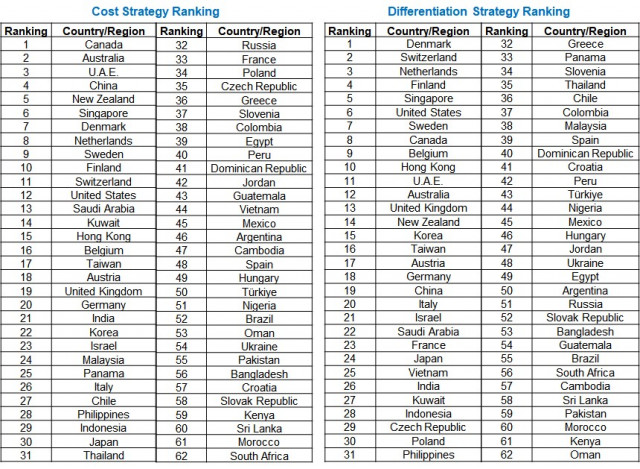Two National Competitiveness Rankings with Cost and Differentiation Strategies
Result of IPS Research Shows that ‘Strategy’ Matters
The other reports on national competitiveness, including those of IMD and WEF, release only one ranking while IPS releases two: differentiation and cost strategy rankings, highlighting the difference in national competitiveness when each of the two strategies is adopted (see Table 1).
IMD, a Swiss business school, defines national competitiveness as a friendly business environment of a country for global firms to invest in. On the other hand, WEF is a Swiss non-profit organization that assesses national competitiveness based on the productive capability of a country’s local firms. Hence, in the 2022 IMD report, Malaysia ranked 32nd out of 63 countries, two places higher than Japan (34th) due to its friendly investment environment. Yet, according to the most recent WEF report in 2019, Japan which has local firms with high productivity was ranked 6th among 141 countries, much higher than Malaysia (27th).
The two co-researchers of the IPS national competitiveness research, Dong-sung Cho (Professor Emeritus of Seoul National University Business School) and Hwy-chang Moon (Professor Emeritus of Seoul National University Graduate School of International Studies) stated “the competitiveness rankings of IMD and WEF are less concerned about the role of strategy and mainly assess the national competitiveness based on how much resource a country has. On the other hand, the IPS competitiveness research releases two rankings, based on cost and differentiation strategies, because the national competitiveness can be different despite the same level of endowed resources a country has. Hence, the strategy plays a crucial role in determining the national competitiveness.”
‘National Competitiveness Ranking for Cost and Differentiation Strategies’ shows the 2022 rankings of IPS National Competitiveness Research. For the cost strategy ranking, Canada, Australia, and United Arab Emirates ranked in the Top 3, followed by China and New Zealand. For the differentiation strategy ranking, Denmark, Switzerland, Netherlands, Finland, and Singapore ranked in the Top 5. Therefore, two completely different results can be seen from the two types of strategy rankings. This thus implies that the competitiveness of a country can result in two contrasting competitiveness rankings depending on its strategic choice and resource allocations.
For example, when China adopts a cost strategy, it ranks 4th while this drops to 19th when China adopts a differentiation strategy. Similarly, Saudi Arabia ranks 13th when it adopts a cost strategy, and goes down to 22nd with a differentiation strategy. By contrast, when the US adopts a cost strategy, it ranks 12th, yet this climbs to 6th when it adopts a differentiation strategy. Similarly, Denmark ranks 7th if it adopts a cost strategy, while it goes up to 1st when it adopts a differentiation strategy. Therefore, a cost strategy is appropriate for countries with rich resources, whereas a differentiation strategy is more suitable for developed countries that are capable of producing higher-quality products.
IPS assesses national competitiveness based on eight factors which are composed of four physical factors and four human factors. The physical factors include supply conditions, demand conditions, related industries, and business context. The four human factors include workers, policymakers & administrators, entrepreneurs, and professionals.
By adopting the most appropriate strategy and cooperating with other countries, a country can also enhance its national competitiveness by leveraging its partners’ strengths and complementing their weaknesses. For instance, although South Korea and Switzerland are located in different regions and endowed with different resources, there is a room for cooperation to enhance their competitiveness. Switzerland’s strengths particularly lie in sophisticated demand conditions and professionals with intellectual property rights and service. By contrast, South Korea shows particular strengths in related industries such as communication and electronics, and entrepreneurs’ core competences such as networking and creating new business. Hence, both countries can cooperate and share strengths with each other and create synergies for improving their national competitiveness.
About IPS (The Institute for Industrial Policy Studies)
IPS was established in South Korea in 1993 and moved its research activities to Geneva, Switzerland in 2020 to globalize the national competitiveness research, in cooperation with UNITAR and Taylor Institute of Franklin University Switzerland.
Website: https://www.ipsncr.org/
Contact
UNITAR
Chief
Yonas Haertle
Send Email
IPS-NC
Chair
Hwy-chang Moon
Send Email
aSSIST University
Vice President
Yong-Joo Choi
Send Email
IPS-NC
Researcher
Dilong Huang
Send Email
This news is a press release provided by IPSNC (The Institute for Policy and Strategy on National Competitiveness).



